Iwasaki Shares the Future of Project Management and Infrastructure with Kahua in 2024
Randy Iwasaki is a seasoned professional with extensive experience in project management and transportation. His background includes working with the California Department of Transportation (CalTrans), Contra Costa Transportation Authority (CCTA) and Amazon Web Services (AWS).
Earlier this year, Iwasaki signed on to advise Kahua on what is most important to state agencies charged with planning, executing and overseeing the construction of roads, bridges and other transportation projects across the country.
“There are challenges and opportunities in the transportation sector, and I certainly emphasize the importance of modern project management tools, modular software, effective funding management, and the need for educating industry leaders about the benefits of IT modernization,” he said.
"I have a lot of admiration for Kahua's commitment to providing flexible, customer-focused project management solutions. The enthusiasm of the Kahua team, its emphasis on customer service and the product's flexibility particularly appealing.”
Here, he looks at several critical aspects of construction project management and the transportation industry as 2024 kicks off.
Project Management Tools: “The importance of modernizing project management tools in the transportation sector cannot be overstated. The transition from traditional methods involving spreadsheets and manual data input to the adoption of more efficient software – like Kahua – will streamline project management processes. State administrations and CIOs need to be educated by the industry about the advantages of modernization, including the adoption of cloud-based technologies. Overcoming resistance to change and misconceptions about technology is a crucial aspect of this process.”
Continuous improvement is a key driver for scaling your capital portfolio. As an owner, you want to leverage the latest software technologies that enable and support future growth. When the right digital tools are in the hands of the right people at the right time, communication and operations can be in perfect sync.
Monolithic vs. Modular Software: “There are great advantages of modular software like Kahua, which allows for flexibility and customization. Unlike monolithic software, modular solutions can be tailored to the specific needs of transportation departments (DOTs). The greatest advantages of Kahua include ease of implementation, a modular nature that allows for flexibility, a supportive platform and the passion of the Kahua team. These factors can be compelling for DOTs looking to modernize their project management processes.”
Kahua software is so powerful, it can conform exactly to your current processes while also providing the agility to rapidly pivot with the ever-increasing pace of change. This software enables operational efficiency by letting you run the business the way you want to … rather than the way the software tells you to.
You don’t have to wait for a software upgrade or submit a vendor request for new features and hope that what you need will make it into the next release. Great ideas can only add value if implemented, and with Kahua, you can take your business exactly where you want it to go.
Project Delivery: “One of the most important missions for DOTs is efficient project delivery. They must focus on delivering projects and programs as promised to taxpayers, highlighting the importance of effective project management software in tracking progress from a cost and schedule perspective while and maintaining transparency.”
Ask anyone if there needs to be transparency in government construction projects, the answer is going to be a resounding, “yes.” But the “why” is so much more complex than the “if.” Initially, the reason that comes to mind is to keep the government accountable to its constituents.
And that does play a big role in the need for transparency to the public. Transparency ensures that the government is held accountable for how it spends taxpayer dollars on construction projects. If the public can know how the funds are allocated and used, they can hold government officials responsible for any misuse or waste of funds or establish a trust if they are good stewards of the funds.
Funding and Cost Management: “There are challenges related to managing funding sources, especially in an era of increased federal funding (IIJA). These include the need to track, allocate and manage funds effectively, including matching grants with other fund sources, which require careful financial management.”
The diversity of funding sources for capital programs across the U.S. creates a challenge in both the planning and execution of projects. From grants, bonds, government funds and special-purpose taxes, managing project finances presents a challenge. In many cases these different funding sources will have specific, and often complex, rules for how the funds are appropriated, released and utilized. The challenge is magnified when multiple sources of funds must be managed across many projects at the program level.
Emerging Transportation Trends: “Connected autonomous vehicle (AV) technologies and connected vehicle (CV) technologies are at the forefront of DOT priorities. These technologies aim to address road safety concerns and improve transportation efficiency. Also, there is a growing role of AI and machine learning in transportation, especially around the value of AI in data analysis. Document control and record management are important especially in the field, where mobile capabilities can significantly improve efficiency.”
There is a growing role of AI and machine learning in transportation, especially around the value of AI in data analysis, Iwasaki said. Document control and record management are important especially in the field, where mobile capabilities can significantly improve efficiency.
Machine learning algorithms can analyze historical project data to predict potential risks and delays, enabling proactive decision-making. AI-driven project management tools can streamline scheduling by considering factors such as weather conditions, traffic patterns and resource availability.
Challenges in Recruiting: “The transportation industry is facing challenges in recruiting a new workforce, particularly among younger professionals who are more inclined to join the tech sector. Encouraging interest in the transportation industry is vital for future success.”
The more in demand these jobs become, the more construction companies will have to pay for them. It is basic economics. The Associated General Contractors of America reported this summer that 93% of its membership had openings for skilled trade workers. Today’s young workers are comfortable with technology, and they expect their employers to provide the tech that can make their work easier, safer and more efficient. Included in that is a construction project management information system that allows all levels of management and workers to access real-time data, make decisions based on a single source of truth and communicate in a space open to all.
Education and Modernization: “State administrations and CIOs need to be educated by the industry about the advantages of modernization, including the adoption of cloud-based technologies. Overcoming resistance to change and misconceptions about technology is a crucial aspect of this process.”
***
Kahua is partnering with GovTech and Campos Sage on Jan. 18 for a webinar exploring a custom solution designed specifically for transportation organizations to tackle the many challenges in this highly regulated industry. From services to track funding, creating transparency in Right of Way and Permitting, Kahua and Campos Sage have a solution tailormade for the Transportation Owner.
Save your seat today by registering for Smoother Roads Ahead: PMIS Insights for Transportation Projects.
***
Do you agree with these considerations being the most important ones facing transportation projects in 2024? Please share your ideas below.


